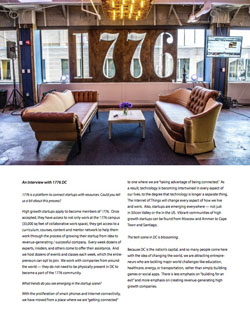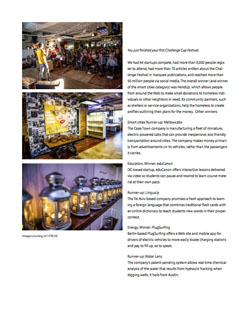Start It Up, An Interview with 1776 DC
1776 is a platform to connect startups with resources. Could you tell us a bit about this process?
High growth startups apply to become members of 1776. Once accepted, they have access to not only work at the 1776 campus (33,000 sq feet of collaborative work space), they get access to a curriculum, courses, content and mentor network to help them work through the process of growing their startup from idea to revenue-generating / successful company. Every week dozens of experts, insiders, and others come to offer their assistance. And we host dozens of events and classes each week, which the entrepreneurs can opt to join. We work with companies from around the world — they do not need to be physically present in DC to become a part of the 1776 community.
What trends do you see emerging in the startup scene?
With the proliferation of smart phones and Internet connectivity, we have moved from a place where we are “getting connected” to one where we are “taking advantage of being connected.” As a result, technology is becoming intertwined in every aspect of our lives, to the degree that technology is longer a separate thing. The Internet of Things will change every aspect of how we live and work. Also, startups are emerging everywhere — not just in Silicon Valley or the in the US. Vibrant communities of high growth startups can be found from Moscow and Amman to Cape Town and Santiago.
The tech scene in DC is blossoming.
Because DC is the nation’s capital, and so many people come here with the idea of changing the world, we are attracting entrepreneurs who are tackling major world challenges like education, healthcare, energy, or transportation, rather than simply building games or social apps. There is less emphasis on “building for an exit” and more emphasis on creating revenue-generating high growth companies.
You just finished your first Challenge Cup Festival.
We had 64 startups compete, had more than 9,000 people register to attend, had more than 70 articles written about the Challenge Festival in marquee publications, and reached more than 50 million people via social media. The overall winner (and winner of the smart cities category) was HandUp, which allows people from around the Web to make small donations to homeless individuals or other neighbors in need. Its community partners, such as shelters or service organizations, help the homeless to create profiles outlining their plans for the money. Other winners:
Smart cities Runner-up: Mellowcabs
The Cape Town company is manufacturing a fleet of miniature, electric-powered cabs that can provide inexpensive, eco-friendly transportation around cities. The company makes money primarily from advertisements on its vehicles, rather than the passengers it carries.
Education, Winner: eduCanon
DC-based startup, eduCanon offers interactive lessons delivered via video so students can pause and rewind to learn course material at their own pace.
Runner-up: Lingua.ly
The Tel Aviv-based company promises a fresh approach to learning a foreign language that combines traditional flash cards with an online dictionary to teach students new words in their proper context.
Energy, Winner: PlugSurfing
Berlin-based PlugSurfing offers a Web site and mobile app for drivers of electric vehicles to more easily locate charging stations and pay to fill up, so to speak.
Runner-up: Water Lens
The company’s patent-pending system allows real-time chemical analysis of the water that results from hydraulic fracking when digging wells. It hails from Austin.
Health Care, Winner: CancerIQ
Based in Chicago, CancerIQ allows oncologists to collect genetic information from cancer patients and compare that information against a large database of similar patients. The goal is to identify high-risk patients and offer preventative treatment.
Runner-up: MediSafe
Also from Tel Aviv, MediSafe uses a mobile app to remind patients when it’s time to take prescribed medication, reducing the likelihood of inconsistent doses that may lead to further health issues and medical expenses.
Open data.
Many of our members and portfolio companies are leveraging this. As more and more data becomes available, startups will flourish around it. If you look at weather data for example, opening that created a several billion dollar industry of companies that are leveraging it. The same will happen in energy and healthcare — providing consumers data to help drive behavior change.
Steve Jobs said: “Do what you love. Put a dent in the universe.”
All of our companies are focusing on solving big world challenges — solving problems in our education system, providing access to electrify, helping the homeless. For us, it’s tremendously exciting to see startups using the proven startup / tech model to tackle social problems, and as investors, we are thrilled as well to be getting an ROI from that. A win-win.
Three pieces of advice for startups.
1. Learn about what it means to build a lean startup — get out and talk to customers; don’t build it unless you know for sure someone will buy it. 2. Do your homework — read the materials available, educate yourself — don’t be lazy and rely on others to do your work for you. 3. Know your data / metrics — traffic, users, conversion, cost of customer acquisition, lifetime value — there is gold in the data.



